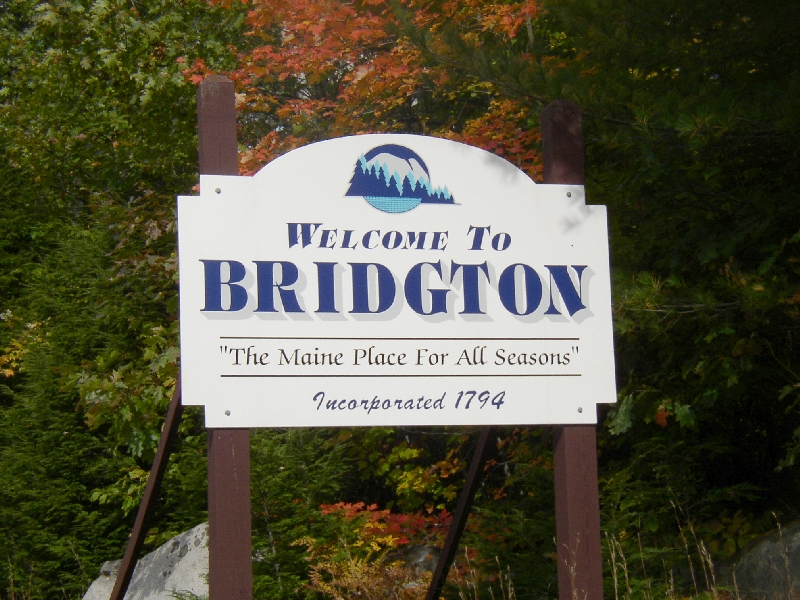Maine department of inland fisheries and wildlife allows beaver relocation but it is fairly sanguine about its success…
Research has shown that beavers seldom survive relocation, and those that do often move great distances from the release site. Younger beaver in particular may not survive if they are separated from their family group, removed too late in the season, or relocated to an unsuitable (or occupied) area.
Keep that in mind as you read this:
 Bridgton — Beavers to be evicted from Elm Street neighborhood
Bridgton — Beavers to be evicted from Elm Street neighborhood
The beavers living in a brook off of Elm Street will soon face eviction. Hearing a case from a resident and property owner that the dam poses a risk to public safety, the Bridgton Select Board Tuesday night agreed to reimburse a citizen up to $1,600 to hire someone to trap and relocate the beavers.
Selectman Paul Tworog brought the problem to the board several weeks ago, but officials delayed action until they received a legal opinion on whether taxpayer money could be spent on work done on private property. Public Services Director David Madsen was advised by the Maine Warden Service that any beaver issue on private property is the “sole responsibility of the landowner.”
Taxpayer money should benefit EVERYONE not just the landowner. Now I could argue that if the city used that 1600 to install a flow device to control the dam height and allow the beavers to remain it WOULD help everyone. More fish. More wildlife. Cleaner water. Fewer fires.
But hey, that’s just me.
Public Services Director David Madsen was advised by the Maine Warden Service that any beaver issue on private property is the “sole responsibility of the landowner.”
The town posed the question of using public funds to reimburse a property owner for trapping beavers to Drummond Attorneys at Law in Portland. Attorney Alexander Pringle’s opinion is “the town may not reimburse the private individual for the beaver trapping because doing so would violate the Public Purpose Doctrine, as expressed in Maine law.”
Pringle noted that under Maine common law, the Public Purpose Doctrine requires that the expenditure of public funds must be for a public purpose. “While I cannot be certain how a court would apply the Public Purpose Doctrine, based on the facts as presented, I think a court would find that the removal of the beavers primarily benefited the property owner without any appreciable benefit to the public,” Pringle wrote. “Any benefit to the public resulting from the removal of the beavers and/or dam would need to be more than incidental in order to justify the use of public funds.”
However, Tworog argued that expenditure of $1,600 to remove the beavers would be in the “public good,” eliminating the threat of flooding on Park Street and damage to businesses and the Music on Main venue. He added dam removal is “clearly a proactive protection of public property.”
The town posed the question of using public funds to reimburse a property owner for trapping beavers to Drummond Attorneys at Law in Portland. Attorney Alexander Pringle’s opinion is “the town may not reimburse the private individual for the beaver trapping because doing so would violate the Public Purpose Doctrine, as expressed in Maine law.”
Pringle noted that under Maine common law, the Public Purpose Doctrine requires that the expenditure of public funds must be for a public purpose.
Well well well. Isn’t that just a pickle. He wants funds to remove these beavers. The town wants to remove the risk. And no one can see past the nose on their own faces to realize there is a better solution.
“The damage that the water is doing is catastrophic,” he added. “I am not here asking for money. I’m not asking the town for money. I’m asking them to solve a problem…We’re all in this together. How we go about this, we all have to do it together. Is there flooding down in your town property? Yes, there is. It’s coming. It will happen.”
Chadbourne noted that state law requires a town to petition the state to remove nuisance beaver “if the municipality demonstrates that beaver-related activities have blocked or partially blocked or can block any public way, jeopardize a culvert or the integrity of the roadway.”
Tworog called for the board to take a proactive stance, and spend $1,600 to resolve the problem. “It is a good use of the money for a public good,” he said. “This is for the public good of the town, therefore, it is a legal expenditure.”
The motion to spend up to $1,600 for beaver removal passed 3-2 with Tworog, Ken Murphy and Carrye Castleman-Ross voting in favor, Bob McHatton and Lone opposed.
Sure. According to our OWN experts they’ll most likely die. But they’ll do it somewhere else and tax payers will fund it.
Sounds like a city decision to me.







































2 comments on ““BRIDGTON, KILLING BEAVERS SINCE 1794””
Bev Soychak
July 6, 2024 at 3:45 pmWhy are they not doing a flow device ?
It’s a long term solution to a problem?
I wish towns would have open minds and understand the financial benefits to having flow devices. It’s happening everywhere very successfully . Lots of crazyness and of course the beavers will suffer.
heidi08
July 7, 2024 at 7:10 amTowns need people to point the way.